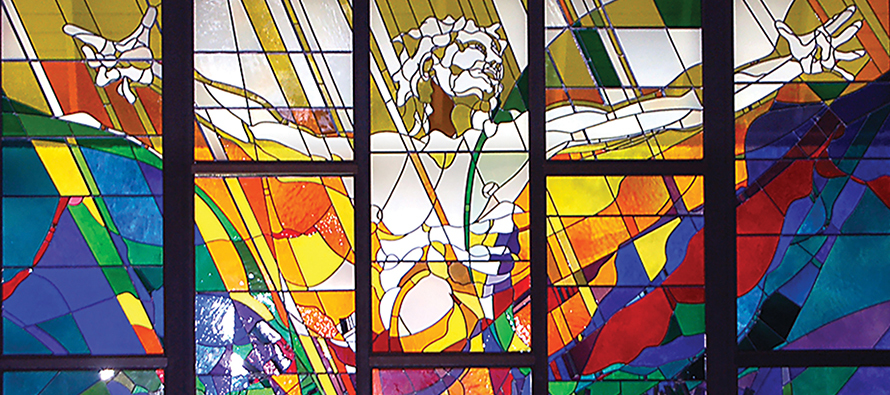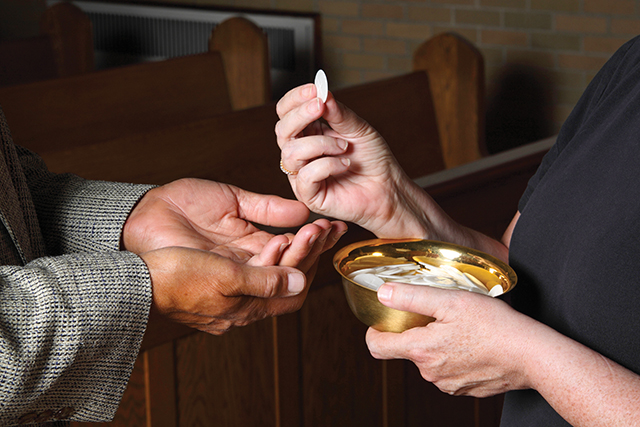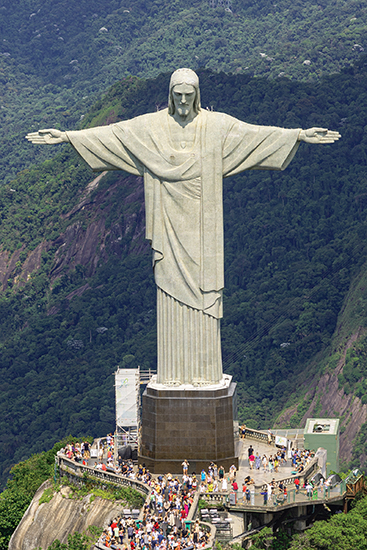What Catholics believe about Jesus

Jesus told his followers, “I am the light of the world” (John 8:12). Pictured here is “Resurrection and the Light” window at St. John the Evangelist Church, Prairieville, Louisiana. (Image courtesy of the Catholic Commentator)
"IN THE NAME of the Father, and of the Son . . . .” Wait! Hold it right there. What do you mean, the “Son”? Who is the Son? Who is this Jesus, whose name we use so freely, whose image shows up on bumper stickers, hangs on our walls, and even dangles from our ears? What do Catholics believe about this Jesus?
Truly God, truly human
He’s the Son of God of course. And in that designation “Son” is wrapped up a world of meaning.
First, Jesus is the full and complete revelation of God. Jesus makes the invisible God visible to us and real in a way we can access and engage. To be truly the Son of God, Jesus was conceived by the Holy Spirit, the only begotten of the Father. That is important so we can understand that Jesus wasn’t our idea; he was God’s. God, out of love for us, made it happen.
Jesus is also the “Son of Man.” God is a mystery beyond our understanding but Jesus is one of us, born of a woman, like us in flesh and blood. Jesus knows what it’s like to be a human being, to suffer weakness and temptation, to hunger, to laugh and to cry, to love and to be afraid, to be frustrated, angry, happy, and hopeful. He knows what it’s like to grow up in a human family, to upset his parents, and to leave home and set out on his own. He knows acceptance and rejection. He even knows what it’s like to suffer and die. Though he did not commit sins, he carries the burden of our sins and suffers the consequences of them. Jesus does it all for us.
The Nicene Creed wraps all this up by saying that Jesus is true God and true man. In other words, Jesus is God, through and through. There is no factor of divinity missing in Jesus. He always existed and always will exist. All things exist through him, with him, and in him. He is the source of all that is, the beginning and the end of everything.
At the same time, Jesus is truly human. That means that even though he was, is, and always will be God, in a moment of time he entered history as a human being. The forgiveness won for us by the sacrifice of Jesus atones not only for our sins but the sins of all the world.

The Lamb of God
There is a kind of cosmic principle that governs life in this world that is expressed in various ways. For instance, we say, “What goes around, comes around” or, “You reap what you sow.” People sometimes use the term karma, common to Hinduism and Buddhism, a word that represents the natural, impersonal law of moral cause and effect found in the universe. Simply put, we say that you pay for your sins.
Well, Jesus picked up the tab. Whatever you did, said, or even thought that was wrong, Jesus took the hit for you. At Mass we call Jesus the “Lamb of God who takes away the sins of the world.” Jesus was accused, arrested, brought to trial, judged, condemned, and put to death. That about covers it for all of us who are guilty of sin.
To ancient people who made their living off their flocks, lambs were considered the most valuable possession of the tribe, their hope for the future. In an annual ritual, one of the lambs, supposedly the best one, was offered to God as a sacrifice to pay the price, the cosmic debt owed by the people. The lamb was offered for the forgiveness of sins.
Jesus is the Lamb of God offered for the forgiveness of our sins. Because it is God’s offering, it is infinite. That means that the forgiveness won for us by the sacrifice of Jesus atones not only for our sins but the sins of all the world. That’s everybody. No exceptions. It is also eternal. That’s why in the Apostles’ Creed we say Jesus “descended into hell” to spring all those who died in sin before the event of Jesus and were paying off their debt. The eternal redemption of Jesus reaches back in time to Adam and forward in time to the end of the world. That’s awesome.
Jesus the healer
In the forgiveness of sins we also have healing, and Jesus is the healer. The gospel stories of Jesus link his many miracles of healing with forgiveness. Our sins, and the sins of all the world, bring about conflict and discord. When we sin, we set ourselves against the purpose for which we were created: to know, love, and serve God and to be happy with God forever. Sin, in other words, takes away our peace, our ease. Forgiveness restores peace to the soul, reconciles the person with the purpose, and sets the person once again on the path to fulfillment. Jesus is the Prince of Peace, the healer who reconciles humanity with God.

A sign of contradiction
When Mary and Joseph brought the infant Jesus to the temple, the prophet Simeon referred to him as a “sign that will be contradicted.” You figure anyone whose mother is a virgin would have to be somewhat of a contradiction! This contradiction is also seen in the proclamation of the kingdom of God. In it, Jesus says, the last shall be first and the first shall be last; the blind see, the lame walk, the deaf hear. Jesus is the dead man who lives, the source of life for all who die. He is the sinless Son of God who is judged by the world and condemned to death. He is the sign the world contradicts.
That is why Jesus calls his followers to “repent, for the kingdom of heaven is at hand.” The word repent simply means “to turn around”; to change—good advice considering that the world and all that is in it is passing away, but the Kingdom is coming and it will endure forever. Take your pick: “What profit do you show,” Jesus says, “if you gain the whole world and lose your own self?”
The Bread of Life
All of these aspects of who Jesus is are embodied in the Eucharist, the source and summit of sacramental life in the church. When we gather together for Mass, Christ is made present in numerous mystical ways.
He is made present in the assembly of the people. The Body of Christ is made up of its members, those who live through, with, and in Christ.
Christ is made present in the Word of God proclaimed and received by the assembly, for Jesus is the Word made flesh, the revelation of God. Jesus is the total and complete revelation of God contained in all of the Bible, the Word of God, not only written on a page or spoken by a reader but embodied and lived by Jesus.
Jesus is also made present in the person of the priest who presides at the altar, the table of the Lord’s sacrifice. The eternal reality of the Lord’s Supper breaks into time at the Mass. As Jesus reclined at table with his disciples, so the priest stands at the table of the Lord’s Supper with the faithful.
Jesus is the Bread of Life. He is present in the Eucharist; his Body and Blood are manifested under the appearance of bread and wine. In the celebration, the bread is offered and becomes his Body; the wine is offered and becomes his Blood. He is Emmanuel, “God with us.” The mystery of faith is revealed: When we eat this bread and drink this cup we proclaim his death until he comes again.
The “come again” part is experienced in two ways. One is that Jesus will come again at the end of time. The other way is that Jesus comes all the time. As he comes in Baptism to unite us with himself in dying and rising, and to wash us clean of our sins, so he comes to us again and again in the sacraments of the church, Baptism, Eucharist, Confirmation, Matrimony, Reconciliation, Holy Orders, and Anointing of the Sick.
All of the above is communion with Jesus. Everything we believe about Jesus is realized in the meal of his Body and Blood. We become what we eat. In that he has taken the form of our human existence, bearing the cross of our sins, suffering with us, even dying with us, so too we are invited to join him in the reality of his divinity. To the degree that we conform our thoughts, words, and actions to that of Jesus, then to that degree we are one with him. Jesus has done his part. It remains for us to do ours.
A version of this article originally appeared in VISION 2012.
Related: VocationNetwork.org, “What Catholics believe about the Eucharist.”
Tags
Related
- Questions Catholics Ask
- What Catholics believe about the Eucharist
- How Jesus embraced his call
- Prayer: Our never-ending conversation with God
- What the church is teaching—and learning—about the sin of racism
- Church defined: Jesus calls; we respond
- A Creed to believe in
- On whose authority?
- Ten great things about being Catholic
- Following Jesus: Be ready for some surprises Read More
Most Viewed
- Find your spirituality type quiz
- Questions and answers about religious vocations
- Celibacy quiz: Could I be a nun? Could I be a brother? Could I be a priest?
- Resources for older discerners or those with physical and developmental differences
- About Vocation Network and VISION Guide


